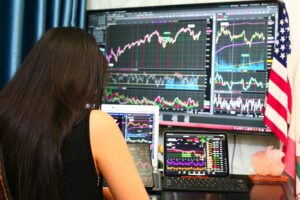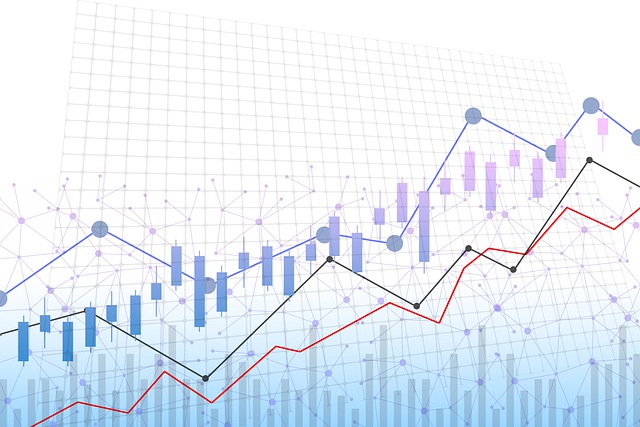I have personally witnessed the industry’s swift evolution over the past few years. From manual trading to algorithmic systems and now blockchain-powered platforms, it is evident that technology is driving substantial changes in the way currencies are traded.
In this article, I will discuss some of the emerging trends and technologies that will influence the future of foreign exchange trading. By comprehending these developments, traders can remain ahead of the curve, anticipate market shifts, and capitalise on new profit opportunities.
So, without further ado, let’s enter into what the upcoming years hold for forex traders.
Computerised Trading Systems
 Thanks to emerging trends and technologies that are revolutionising the industry, the future of forex trading is looking brighter than ever.
Thanks to emerging trends and technologies that are revolutionising the industry, the future of forex trading is looking brighter than ever.
In recent years, algorithmic trading systems have become an international phenomenon. These sophisticated systems analyse market data using complex mathematical algorithms and execute transactions automatically, without human intervention.
Backtesting strategies is one of the most significant advantages of algorithmic trading systems. By simulating past market conditions using historical data, traders are able to test the efficacy of their strategies prior to placing real-money transactions. This allows them to fine-tune their approach and identify areas for improvement, resulting in longer-term outcomes that are more profitable.
High frequency trading techniques are another important advantage of algorithmic trading systems. These systems are capable of executing trades at speeds quicker than any human trader could accomplish manually. This permits traders to capitalise on even the smallest market fluctuations, maximising profits while minimising risk.
As a consequence, algorithmic trading has grown in popularity among forex traders worldwide.
Platforms Powered by Blockchain
In forex trading, blockchain-powered platforms are the latest craze. Blockchain’s decentralised nature has ushered in a paradigm shift that is altering the way forex traders conduct business. This technology offers intriguing opportunities, such as the incorporation of smart contracts and decentralised trading models.
Smart contracts are computer programmes that autonomously enforce the terms of a contract between parties without the need for third parties. When integrated into blockchain-powered platforms, they facilitate faster, more secure transactions while reducing costs and eliminating human error. By providing real-time access to transaction records on a decentralised platform, smart contract integration also facilitates transparency in forex trading.
Additionally, Blockchain-Powered Platforms enable the development of decentralised trading models. In these models, peer-to-peer transactions can occur directly between consumers and sellers, without the need for an intermediary. By removing intermediaries from the equation, traders can benefit from reduced fees, increased liquidity, and enhanced execution efficiency.
Overall, Blockchain-Powered Platforms provide forex traders with numerous benefits. The technology increases security through decentralisation, enables the efficient incorporation of smart contracts, and creates opportunities for decentralised trading models. As this trend continues to expand, we anticipate blockchain to revolutionise forex trading in the future in even more inventive ways.
The Relationship Between Artificial Intelligence And Machine Learning
Can computers surpass humans in forex trading? Many traders and investors who have witnessed the rise of artificial intelligence (AI) and machine learning (ML) technologies have pondered this question.
Predictive analytics, which heavily relies on AI and ML algorithms, is gaining popularity among forex traders because it enables them to analyse vast quantities of data rapidly and precisely.
Natural Language Processing (NLP) is a complementary emergent technology to predictive analytics. NLP enables computers to comprehend and analyse human language, allowing traders to more accurately appraise market news and social media trends. By combining NLP with predictive analytics, traders can make more informed decisions based on a thorough quantitative and qualitative data analysis.
As the future of forex trading becomes increasingly automated, it is essential to remember that these technologies are not intended to completely replace human intuition. The best outcomes will result from a symbiotic relationship between man and machine, in which predictive analytics provides the raw data and our expertise and experience help us accurately interpret it.
As AI/ML technologies continue to advance, it is impossible to predict the future of forex trading, but one thing is certain: those who adopt these emergent trends will be well-positioned for success in this dynamic market.
Three advantages of predictive analytics for forex traders:
- Finding profitable transactions by analysing market patterns
- Minimising risk through real-time position monitoring
- Improving decision-making by providing market behaviour insights
Keep in mind that remaining ahead of the curve requires more than just being the first; it also requires a focus on innovation that adds value over time. Consequently, anyone interested in attaining long-term success in forex trading should prioritise staying current with emerging trends such as AI/ML technologies. By utilising predictive analytics, NLP techniques, and any other innovative tools at your disposal, you can position yourself for greater profitability in the future.
Mobile Trading Applications
Forex merchants have embraced mobile trading applications due to their convenience and accessibility. As technology continues to advance, the sophistication of these applications increases as new features are introduced on a regular basis.
In recent years, one trend that has emerged is the incorporation of gamification features into mobile trading applications. Gamification is the incorporation of game-like elements, such as point systems and leaderboards, to increase user motivation and engagement. When applied to forex trading, this can encourage users to make trades and routinely monitor market trends.
Some mobile trading apps offer rewards for attaining certain milestones, further incentivizing users to participate actively in the markets. User interface design is another essential aspect of mobile trading applications. Not only does a well-designed app appear good, but it also makes it easier for traders to quickly navigate between various tools and functions.
Numerous developers are now emphasising the creation of user-friendly interfaces that cater to the requirements of traders while incorporating real-time data feeds to ensure that information is always current. In conclusion, mobile trading applications are an integral part of contemporary forex trading because they provide traders who wish to trade on the go with accessibility and flexibility.
With gamification features and enhanced user interface designs, these applications can improve the overall experience for traders seeking to capitalise on market opportunities anytime, anywhere.
Social Trading Platforms
After discussing the importance of mobile trading applications in forex trading, let’s move on to a second emerging trend: Social Trading Networks.
Social Trading Networks enable traders to replicate and share the trades of expert investors within a single platform. This eliminates the need for novice traders to possess extensive market analysis and knowledge. Copy trading has grown in popularity because it provides novice traders with access to expert traders’ tested strategies.
Furthermore, community engagement is a crucial aspect of social trading networks that distinguishes them from conventional investment platforms. Through forums or discussion rooms provided by these networks, traders can connect with one another, share their experiences, and learn from their peers.
The sense of belonging they provide fosters trust among users and fosters an environment conducive to learning and development.
How do I begin Forex trading if I have no experience?
Beginners may find the fundamentals of forex trading intimidating, but with the proper guidance and knowledge, anyone can get started.
A beginner’s guide to forex trading should cover the following topics: terminology, market analysis techniques, and trading platforms.
It is essential to emphasise that success in this industry calls for discipline, perseverance, and risk management skills.
Even those with no prior experience can succeed in the forex market if they set attainable objectives and develop a solid trading strategy.
Are There Any Regulatory Bodies Overseeing The Foreign Exchange Trading Industry?
Important to the forex trading industry is regulatory supervision, which ensures that brokers and traders operate within a framework that promotes fairness and transparency.
Several regulatory bodies worldwide supervise the industry, including the Financial Conduct Authority (FCA) in the United Kingdom, the Commodity Futures Trading Commission (CFTC) in the United States, and the Australian Securities and Investments Commission (ASIC) in Australia.
In addition to enforcing rules regarding client fund segregation and monitoring market exploitation, these organisations have a significant impact on how brokers conduct business.
To protect themselves from potential schemes or fraudulent activities, I would advise all traders to ensure that they only work with regulated brokers.
How Can I Minimise The Risks Involved In Foreign Exchange Trading?
I always remind my clients of the adage ‘no risk, no reward.’
It is essential to remember that every investment carries its own set of hazards.
When it comes to forex trading, common errors include a lack of understanding of market trends and excessive leverage.
To reduce these risks, it is essential to implement effective risk management strategies, such as stop-loss orders and portfolio diversification.
Remember that the key to profitable trading is managing risk while taking advantage of potential rewards.
Can an individual who is not a professional trader earn a living through forex trading?
Forex trading is unquestionably a viable source of income for those who are not professional traders. It does, however, necessitate the implementation of effective forex trading strategies for beginners and a strong emphasis on risk management in forex trading.
I strongly suggest that new traders begin with modest investments until they become accustomed to the volatility of the market. In order to make informed decisions regarding when to enter or exit trades, it is also essential to develop a solid comprehension of technical analysis tools and indicators.
Using these strategies and appropriate risk management techniques, anyone can potentially profit from forex trading, regardless of experience level.
How do I keep abreast of the most recent developments and trends in the Forex trading industry?
Maintaining awareness of the most recent Forex trading news and trends is essential for any trader seeking success in this industry. Recent studies indicate that fifty percent of traders devote at least two hours per day to researching market updates and analysing charts.
To stay informed, you can consult reputable Forex trading news sources or online communities where traders share their perspectives and experiences. I suggest subscribing to newsletters from reputable financial institutions and entering forums where you can converse with other traders and learn their trading strategies.
By keeping abreast of industry developments, you will be better prepared to make prudent investment decisions that result in lucrative transactions.
I can confidently assert that this industry’s future is promising. Emerging trends and technologies, including artificial intelligence, blockchain technology, and mobile trading applications, are altering the playing field. These developments are making market participation simpler for both novice and experienced traders.
However, with tremendous potential comes great risk. As a trader, you must be vigilant in minimising these risks through proper education, the development of effective strategies, and disciplined execution.
You can position yourself for success by keeping abreast of regulatory changes and being cognizant of market conditions.
If you are new to forex trading or considering entering the market, do not let its complexity intimidate you. Anyone with commitment and a willingness to learn can become a successful trader.
Who knows, maybe one day we’ll see your name among the industry’s highest earners!








